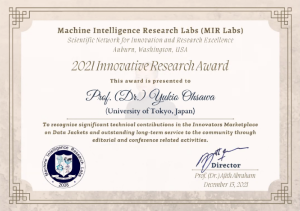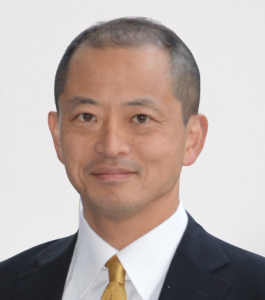Information
2022.1.27(Thu)
Awards and Commendations【Awards and Commendations】Yukio Ohsawa, Professor, received Innovative Research Award
【Awards and Commendations】Name: Yukio Ohsawa, Professor, Department of Systems Innovation,
Professor Yukio Ohsawa received Innovative Research Award at the joint conference of 7 conferences organized by -- Intelligent Systems Design and Applications (ISDA) , Hybrid Intelligent Systems (HIS'21), Information Assurance and Security (IAS), Soft Computing and Pattern Recognition (SoCPaR), Innovations in Bio-Inspired Computing and Applications (IBICA), Nature and Biologically Inspired Computing (NaBIC) ,Information and Communication Technologies (WICT).
〈Name of award and short explanation about the award〉
Innovative Research Award

This award is presented by the Machine Intelligence Research Labs (Washington, U.S.A.) to researchers whose research achievements contribute to innovation in both academia and industry. Yukio Ohsawa came to be the first recipient of this award.
〈About awarded research〉
Reason for the award: Technical contributions in the Innovators Marketplace on Data Jackets and outstanding long-term services to the community through editorial and conference related activities.
Title of the keynote for the award: Elicitation of Feature Concepts as Data Federative Innovation Literacy
Abstract: Since 2000, the speaker has initiated and embodied Chance Discovery, a subdomain of data science, meaning to detect and explain a chance, a piece of high-utility information as part of data about events meaningful for decision-making. At that time, he thought a network of networks can be the essential model for representing the latent dynamics where an edge between networks is linked to a chance. Then, he extended the methods of chance discovery for explaining the utility of datasets, via the analogy between an event as the base and the metadata of a dataset as the target. As well as the base problem of chance discovery, that is to explain the utility of information about an event considering its relation to other events, the utility of a dataset as the target goal could be explained in its relation to other datasets. However, he found information obtained from a dataset created by a combination of different but connectable (sharing attributes and/or purpose of using) datasets is essentially hard to interpret because the same analysis models as of the original datasets cannot be applied directly due to the difference in the requirements of data user(s). Thus, it comes to be an important problem to elicit a new "feature concept" for target data. A feature concept is a model of the concept to be retrieved from data that cannot be represented by a simple feature such as a single variable but can be by a conceptual illustration. Decision trees, clusters, and even deep neural networks can be positioned as examples of feature concepts. A useful feature concept for satisfying a requirement of a data user has been elicited via creative communication using Data Jackets among data providers, data users, and other stakeholders in the market of data. In this keynote, the history of chance discovery and data-jacket-based design of creative communication is reviewed with some cases of application -- marketing, detection of earthquake precursors, suppression of COVID-19 spreading risk, etc., cases and highlight the feature factors elicited and used in these examples. An essential message here is that sharing and using/reusing feature concepts is literacy for data-federative innovations.
〈Your impression & future plan〉
The keynote speech at the time of the award was attended by many people from all over the world who are involved in artificial intelligence research, and I feel that my slogan of "data and innovation by people, for people", breaking away from the stereotype of machine learning and automation, attracted a lot of attention. I don't have to say it, but I believe that this interest is where the world's diverse disciplines are clamoring and storing huge amounts of energy at the "knowledge plate boundary. In April, we will establish "Data Collaboration Innovation Literacy" as a social collaboration course, and promote it with the support and participation of four companies from different industries. We aim to develop in a way that show unexpected value creations to the academic and industrial communities.






